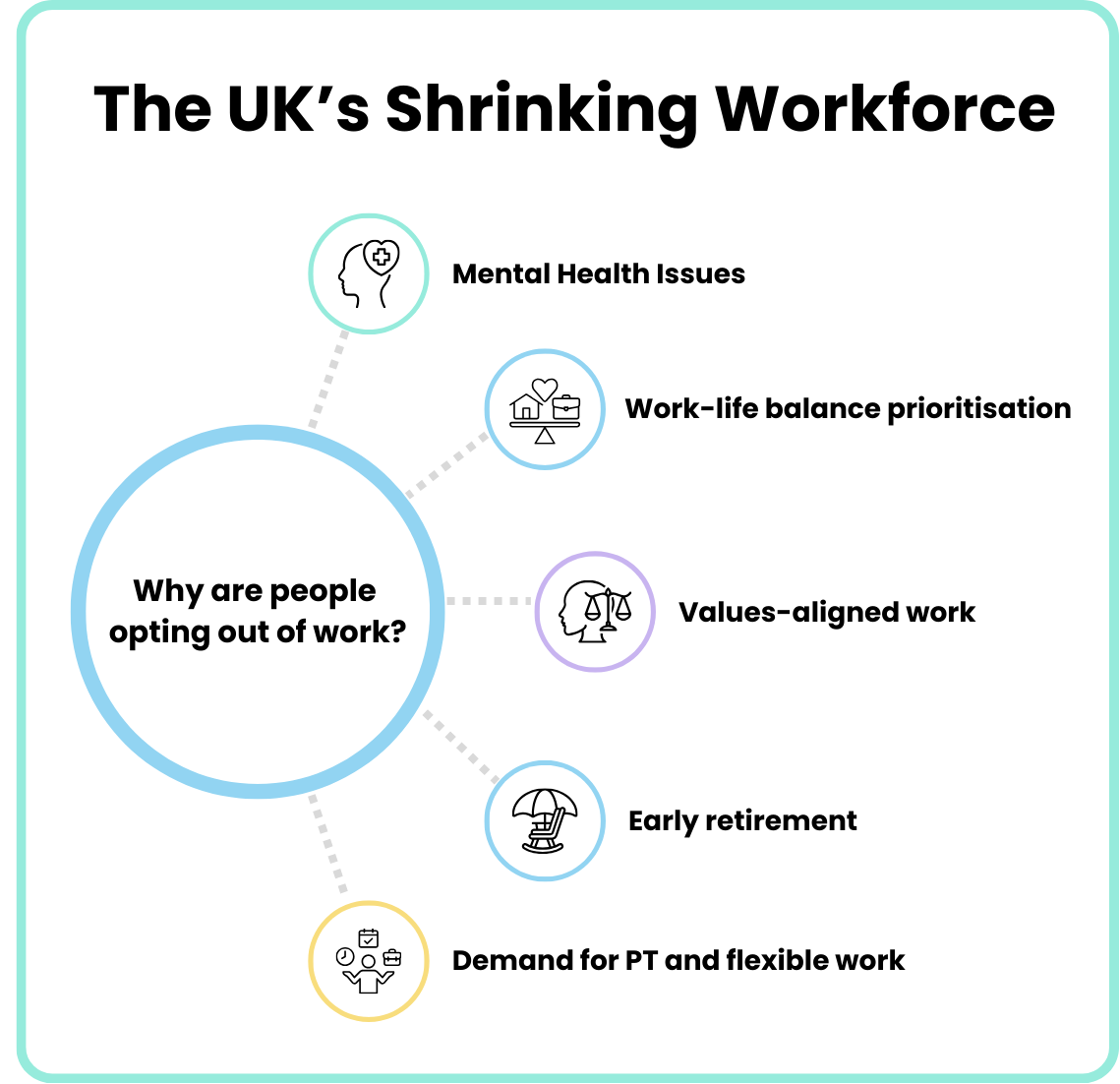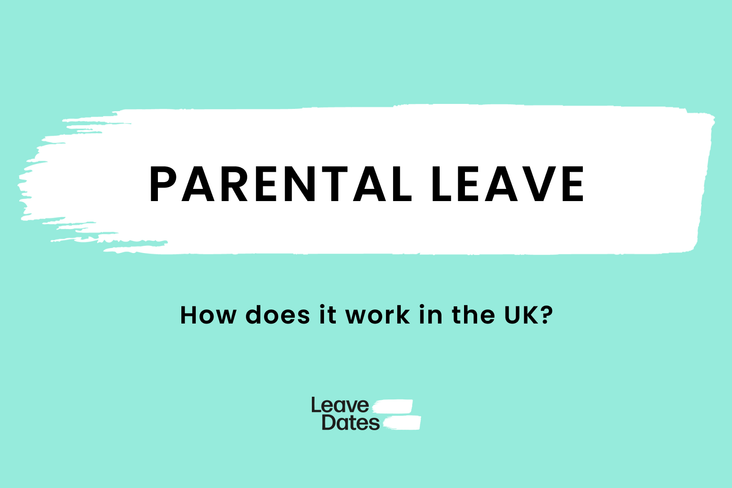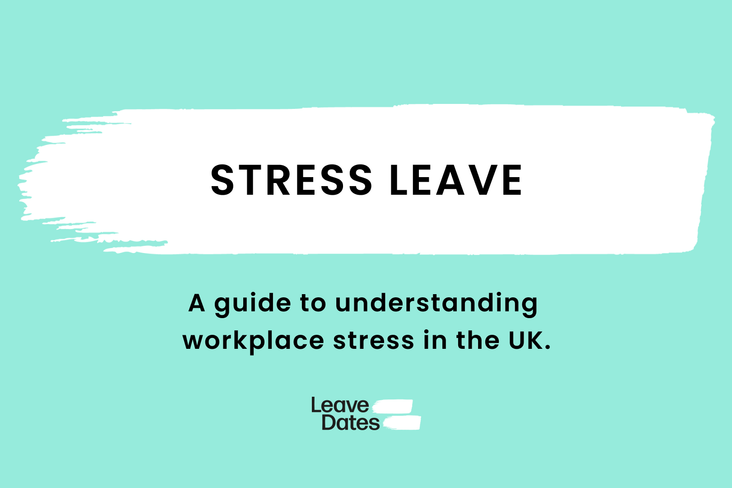
In this article
Quick takeaways
- Creating hybrid and remote work opportunities, four-day workweeks, and workplace flexibility make attracting and retaining staff much simpler.
- Parental leave policies that go above and beyond have great potential to boost workplace participation.
- Always promote physical and mental health and wellbeing, including wellness programs and encouraging staff to take their full annual leave allowance.
The UK's shinking workforce
The UK is currently facing a ‘participation crisis’ when it comes to work, with 800,000 fewer people in or looking for work post-pandemic. This amounts to a 1.5% shrinkage in the labour market since 2019, and is the biggest contraction in the workforce since the ‘80s. Not ideal.
Why people are opting out of work
Whether due to ill health, lack of incentive, or lack of desire, many people are deciding that work is either not feasible, or simply not worth it, and opting out of the labour force. This is bad news for national productivity, and bad news for businesses.
Emerging trends
The main trends we’ve seen emerge post-Covid, which many are calling permanent shifts in mindset and priorities rather than a temporary blip, are:
- A move towards early retirement
- More mental health struggles (and stress leave)
- Demand for more part-time and flexible work
- Especially for young people, a desire for businesses to adopt and embody values aligned with their own
- Greater priority to work–life balance
If these are indeed here to stay, a major rethink is required. So aside from fixing the NHS, the economy, and brokering world peace (too much to ask?), what can business owners and managers do to make work more appealing again?

Workplace flexibility
We think that workplace flexibility is the key. Or at least a big part of the solution.
We are moving towards (if not already in) a world where flexible working is not a perk but a standard practice that benefits everyone, employees and employers alike. It is more inclusive, providing employment options for people who would otherwise be locked out of work due to health issues, caring obligations or other constraints.
Modern world with outdated structures
Modern life is now so far removed from the world that we lived in when the ‘9 to 5’ was born, it’s almost unrecognisable. But we also have many, many more tools and bits of tech that mean we can easily adapt to new and sudden challenges (as Covid taught us). Yet we are still trying to live and work within these rigid structures of time and place.
Rethinking the five-day week
We must face the reality that, post-pandemic, people are not as keen on the idea of a five-day week. And we’ve proven that in many contexts, it isn’t needed. Whether it’s a four-day week, or a mix of office-based and WFH, not clinging to rigid structures if you don’t have to will make you a much more appealing prospect.
Flexibility removed barriers
We need to frame workplace flexibility as a good thing, not a necessary compromise. It removes many barriers that make work less appealing, or simply not an option for some. As well as those who can’t work due to chronic conditions, or caring roles, the neurodivergent may also find a set or traditional work pattern to be off-putting or unsustainable.
Moving away from this as the ‘standard’ where it’s not needed is empowering and offers a sustainable work–life balance that opens the door for more people to join (or stay in) the labour force without risking their health and wellbeing.
The financial value of flexibility
There is another perk linked to flexibility. If your hands are tied when it comes to pay (with historically low wages being another factor driving people away from work), don’t despair. Flexibility has huge value, as it can often save a fortune in other costs, such as avoiding premium ticket prices on commuter trains, extra fees for nursery add-on hours, or the need for a second car.
A lower salary at a job with tons of flexibility could result in more cash in their pocket than a higher salary at a company that insists on rigid hours in a set location.
The balance of power has shifted, and people are no longer prepared to work on any terms – as employers, we need to meet people where they are, with arrangements that work for everyone. Normalising flexible working requires both policy and cultural change, but we think it’s the path to a better work life for all, and better prospects for business in the UK.
The Employment Rights Bill 2024
On the policy front, the Employment Rights Bill 2024 promises to make flexible work a ‘day one’ right. Staff will be able to request flexible working arrangements twice a year, with no minimum service time. Requests can only be refused for eight reasons as set out by the state. While this is a great step, changes won’t come into effect before 2026, so savvy employers can and should get ahead of the pack with this one!
Supporting Parents
We can’t escape the fact that a big chunk of the working age population have (or would like to have) children. So ways to support parents to make work practical and affordable within the scope of a busy family schedule and a tight household budget, must be a part of the conversation.
Work and parenal leave
Juggling work and family life is stressful, and for some it proves to be just one too many plates to spin, or simply not worth it when they weigh up cost vs benefit. As well as flexible working arrangements that help parents to reduce their childcare bill and make work more viable, good parental leave policies are a huge draw for those weighing up whether work can fit into their busy life as a parent.
Build a family-friendly workplace
Leave Dates manages all types of family-related leave with ease, helping you build a supportive culture that works for everyone.
Parents are valuable team members
It is well worth the effort to get parents back into work. Far from the tired ‘constantly distracted’ or ‘always off’ stereotypes, parents bring a ton of value to the table. Their time management skills are off the charts. They’ve been juggling multiple diaries, school runs, planning twenty meals and snacks a day and everything else life throws at them.
This makes them masters of prioritisation – no one can filter what’s urgent from what’s not quicker than someone with kids. Plus, patience is basically a level one skill for parenting and they tend to have a lot of empathy – hugely valuable skills in a team context.
They likely have amazing negotiation and problem-solving abilities too – have you ever had to tell a toddler that the blue bowl is in the wash and you’ve cut their apple into the wrong number of pieces? A client crisis is nothing to them. Parents are as resourceful as it gets – they are an asset that is worth being flexible for.
Impact of poor health
Another big issue contributing to our shrinking workforce is chronic poor health among those of working age. Long NHS waiting lists mean many older workers are incapacitated for longer as they await treatment, and people of all ages are suffering with mental health issues that can make work too taxing. As well as the people who can’t or choose not to work at all, this also results in high rates of sickness absence and stress leave.
Supporting physical wellbeing
As we’ve talked about before, there are lots of things that can be done at the employer level to foster good health among your staff. EAPs that include benefits related to physical and mental wellbeing, workplace wellness initiatives, cycle to work schemes, healthy food in the canteen, gym memberships and the like all help to keep health front of mind.
Mental health positive culture
In terms of mental health, an open and empathetic culture where no stigma is attached to things like mental health days or time off in general, and when boundaries are not only respected but enforced, should go a long way towards reducing the stress and burnout that can put people off work.
Final thought
In the UK, people have left the workforce in droves post-pandemic. Why? The poor state of health of the UK population generally, both mental and physical, is a biggie. But even healthy people are being put off by low pay, poor conditions and high stress.
It sounds like dire straits, but there is a chance for great employers to make themselves beacons of light in the dark. If they do, they will be well placed to attract and retain the immense talent that is still out there wanting to work.
We can change the perception that work doesn’t provide the pay-off it once used to. Two of the big barriers to work are childcare and healthcare. While employers can’t fix these issues at a policy level, there are signs that positive change is coming on that front. In the mean time, they can do a lot to help their own staff in these areas through culture, flexible working and leave policy.
To make work more appealing again, we need to accept that the current ‘standard’ is outdated and reflects values and lifestyles that are no longer the norm. We need to reshape the employment landscape in a way that fits with our modern reality and the new family dynamics and professional and personal values that have come to the fore. By making flexibility the norm, work can work for everyone again.
FAQs
In the post-COVID era, the UK has seen workplace participation fall by 800,000 people. Ill health, stress, childcare and a desire for better work-life balance and conditions have contributed to this.
More opportunities for flexible work, better workplace culture, and family-friendly environments help make employers more attractive to talent.
Flexible work arrangements assist with inclusivity, employee satisfaction, and give employers an edge on their competition. Giving leave options beyond statutory requirements, such as wellbeing days, birthday leave, and extended parental leave, especially paternity leave, boosts workplace flexibility.



